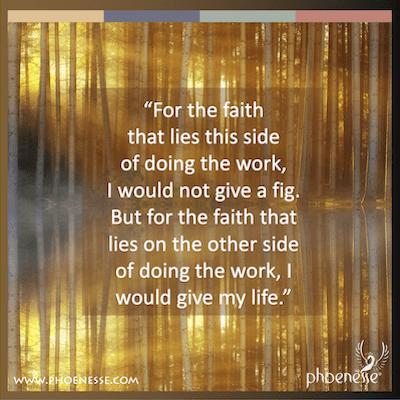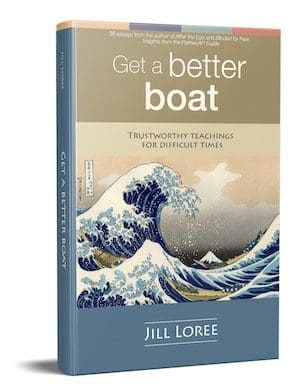
“For the faith that lies this side of doing the work, I would not give a fig. But for the faith that lies on the other side of doing the work, I would give my life.”
I was raised in the Lutheran faith in a small city in northern Wisconsin. This region was populated by settlers from such diverse areas as Norway, Sweden and Germany. So we had more than our fair share of blonde people. By the time I arrived on the scene in the early 1960s, we were basically just a bunch of white people with interesting foods to eat during the Holidays.
When I was twenty-five, I moved to Atlanta where I would settle down for the next twenty-five years. Not long after arriving in Atlanta, my parents came for a visit, and we attended a church service at Ebenezer Baptist church. My mother had long been the organist at our Lutheran church in Rice Lake, and my dad taught vocal music at the University of Wisconsin two-year college in Barron County. So they were both particularly keen to experience the music, and we were not disappointed.
As I recall, we were the only white people attending the service that day, and the congregation couldn’t have been kinder in welcoming us. Dr. Martin Luther King Jr’s daughter was giving the sermon, and afterwards, we waited a short while for recordings of the service to become available on a CD. My dad would go on to use it in one of his music classes at the college.
The congregation couldn’t have been kinder in welcoming us.
This came to mind recently when my mom sent me a clipping about Dr. Martin Luther King Jr from her daily devotional book. It clarified something that had always confused me: Why did Dr. Martin Luther King Jr and Martin Luther, the founder of the Lutheran religion, have such similar names?
Here is the explanation, according to the clipping: “Dr. Michael King Sr, a prominent preacher in Atlanta, toured the Holy Land and Berlin in 1934, sponsored by his church, Ebenezer Baptist. In Germany, Hitler was in power, and Dr. King’s church stood against him.
Dr. King was deeply moved by his visit to the land of Martin Luther and by the reformer’s proclamation of salvation by grace alone through faith alone in Scripture alone. When he came home, King changed his name from Michael to Martin Luther.
His oldest son, Michael, was five. His father changed his son’s name also, to Martin Luther King Jr.”

First we believe
I am struck by the reference to the Lutheran tenet that our faith alone will save us. Most likely, both Dr. King and Dr. Luther understood the deep, unshakable truth about this. But I am guessing that for some people today, the real understanding has gotten lost.
This reminds me of a quote from Supreme Court justice Oliver Wendell Holmes: “For the simplicity that lies this side of complexity, I would not give a fig. But for the simplicity that lies on the other side of complexity, I would give my life.”
In this case, simplicity is faith, and complexity lies in doing the work of healing. In other words, “For the faith that lies this side of doing the work, I would not give a fig. But for the faith that lies on the other side of doing the work, I would give my life.” For that far faith is true faith. And discovering it is what life is all about.
Heaven is within.
To go on a healing journey is to remove the obstacles that are blocking our inner light. Keeping in mind what Christ taught, which is that heaven is within. Before we can embark on such a journey, we can only believe with our ego mind. And belief as a mental concept has no spiritual value. It’s hardly worth a fig. For the ego is a shallow resource. It does not have the ability to comprehend the whole truth.
The ego, in fact, is forever trapped in duality, not unlike the fragments of ourselves caught in child consciousness. The ego, then, can only hold one-half of a whole truth. But in the center of our souls, where we are in unity, we hold all aspects of the truth. Meaning our Higher Self is comfortable holding opposites.
For many people, including many who are deeply religious, having faith and doing the work of inner healing are opposites they can’t reconcile. Left to choose, the ego opts for “faith”—an easy-to-come-by mental idea—and rejects the notion we must do any work to heal ourselves. But ego “faith” is a flimsy boat that’s not worth a fig in the great waves of life.
Then we will know
The daily devotional goes on to say: “Today we remember the founder of our church, Dr. Martin Luther (d. February 18, 1546), his faith in the Gospel, and his declaration of the free gift of salvation given to us unworthy sinners, by grace, from God.”
As the Pathwork Guide teaches, Christ did indeed come to Earth in the form of a man named Jesus. His mission was to open the door for all of us to get back to heaven. That was essentially a free gift. But salvation we must work for. For as the Guide clearly said, “If you do not meet that in you which freezes and paralyzes the living spirit, it is impossible to be moved and lived by the living spirit.”
We simply cannot transcend duality while living from our ego. To transcend duality, we must discover the living spirit at our core. Then our ego must surrender and learn to live from there. Only then can we have a deep inner knowing of the truth, including the truth about how worthy we each are.
That’s how we save ourselves. We save ourselves by finding our deeper true selves, for that is where we find heaven.
Half-truths get us nowhere
If we look around, we see that Christianity is in a state of decline. Lutherans are no longer filling the pews. To understand this, we can turn to the Pathwork Guide’s teaching about the three principles of evil, one of which is confusion. And few things confuse us more than half-truths. More than that, when something is not fully in truth—when we embrace only half of a truth and reject the opposite half—it can’t keep growing. For all untruth equates to negativity, and all negativity eventually grinds things to a halt.
Our work is to use our free will to find and free up that light.
In the case of Christians, many embrace the need to have faith, welcoming the light of Christ in their hearts. But then they fall short in clearing away whatever is blocking that light. There is recognition that we have sinned—none of us are perfect—and that we feel unworthy. These things are true. But that is not the truth of who are. In truth, we are each worthy, because at our core, we are all light.
Our work is to use our free will to find and free up that light. We had the right idea singing in Sunday school: This little light of mine, I’m gonna let it shine. But the follow-through wasn’t there during the rest of the week. People started to see the hypocrisy that resulted. Worse, many people—myself included—were affected by various kinds of abuse that can fester in the unhealed darkness.
As such, many people are turning away from church and gravitating to spiritual paths that face what doesn’t align with the light. This is the growing “Spiritual but Not Religious” group.
For a time, riding this wave—maybe even helping to create it— Pathwork communities were thriving in many regions across this country. Significant healing work was done as people worked to transform their Lower Self.
And then the wave started to recede.
For many who were drawn to Pathwork had strong negative feelings about church. To avoid offending anyone—to keep people from leaving Pathwork—the topic of Christ rarely came up. Seldom in my own decades of Pathwork experience did anyone acknowledge that the whole point of doing all this inner cleaning work is to live in a clean house—a house that Christ built.
Letting the light of Christ shine
The Guide teaches that transforming our Lower Self is always an act of our Higher Self. It is our inner light that inspires us to become better. It is our own faith that there could be more to life that compels us to search for deeper meaning. In the end, it will be our willingness to take self-responsibility for what disconnects us from our own core that will bring us home to God.
Christ is going to come again, but not as a person. The next time Christ comes it will be through each one of us when we do the necessary work of clearing away our negativity and calling forth our inner light. When we do that, we will learn how to live together in harmony and in true faith.
—Jill Loree

We can heal | AFTER THE EGO • BLINDED BY FEAR
The Real. Clear. series | HOLY MOLY • FINDING GOLD • BIBLE ME THIS • THE PULL • PEARLS • GEMS • BONES • NUTSHELLS
The Self. Care. series | SPILLING THE SCRIPT • HEALING THE HURT • DOING THE WORK
More spiritual books | WALKER (a memoir) • SPIRITUAL LAWS • WORD FOR WORD • KEYS (Pathwork Q&As)


